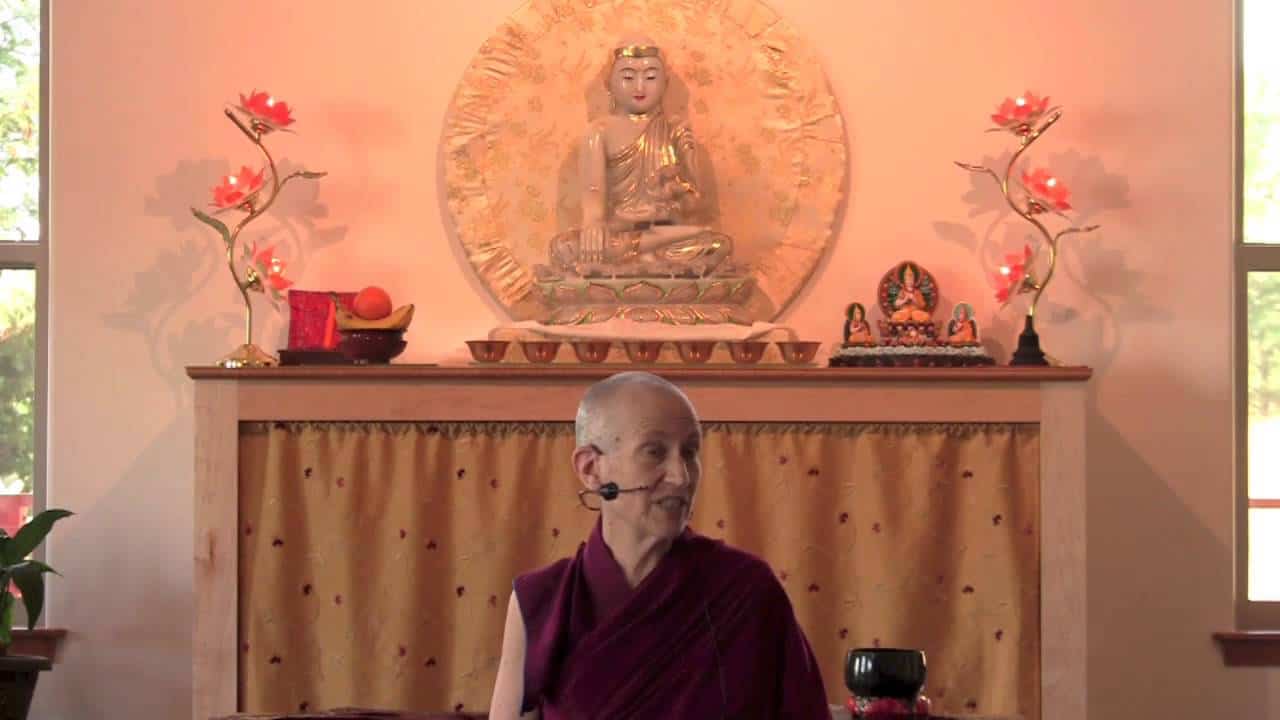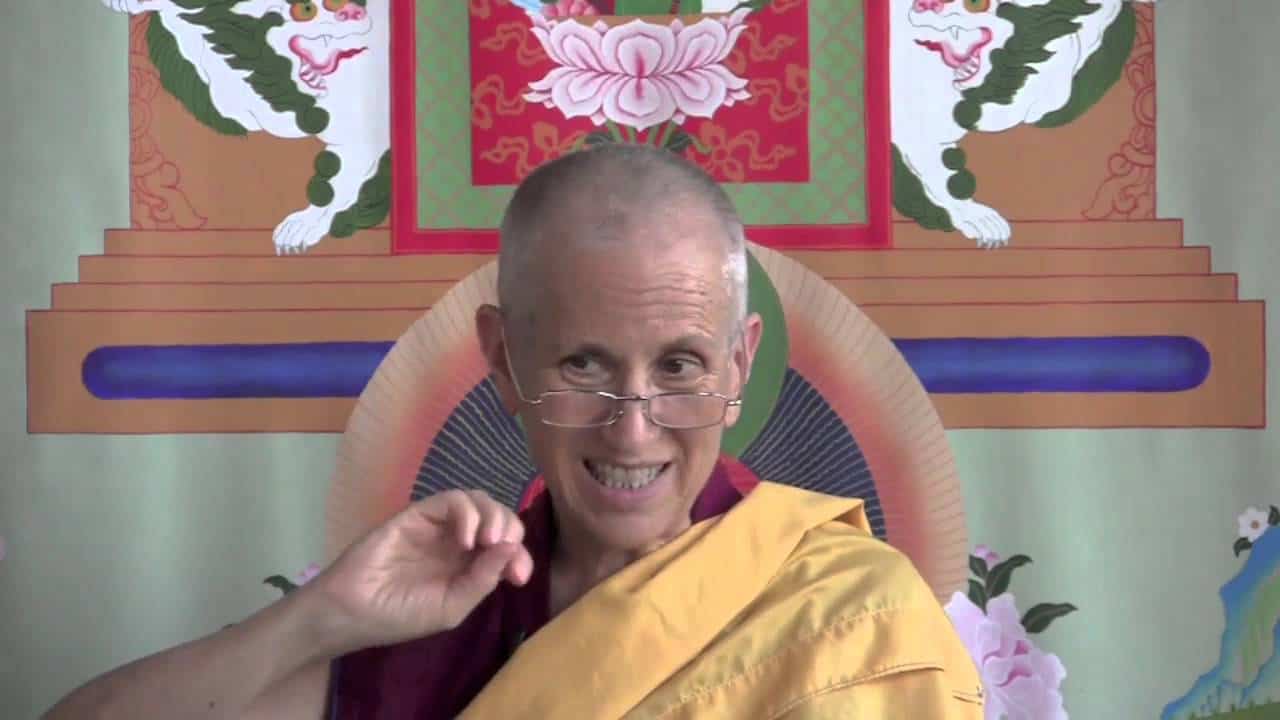The purpose of remembering death
Part of a series of teachings on the text The Essence of a Human Life: Words of Advice for Lay Practitioners by Je Rinpoche (Lama Tsongkhapa).
- Recalling death, setting our priorities to practice virtue and avoid nonvirtue
- Recalling the certainty of death, and the importance of practicing Dharma now
- How remembering death invigorates our practice
The Essence of a Human Life: The purpose of remembering death (download)
We’re still on Verse 4:
Death will definitely come and will quickly come.
Should you neglect to train your thoughts
again and again on such certainties
you will grow no virtuous mind,
and even if you do, it will be spent
on enjoyment of the glories of this life.
Why is it that if we don’t remember death again and again then no virtuous mind will grow? And even if one does does grow, it gets lost in the glories–the pleasures–of this life.
That’s because when we recall our death it helps us set our priorities. And, of course, as practitioners our priorities are practicing the Dharma, transforming our mind, purifying negative karma, creating good karma, and so on. So when we remember our mortality we remember what’s important, so we remember the Dharma. When we don’t remember our mortality, or we think we have lots of time in the future, then Dharma can wait. It’s not so important. It’s not so urgent. And when we have that attitude that Dharma is not so urgent then we forget about karma.
Because what does it mean that Dharma is urgent? It means that creating virtue and abandoning nonvirtue is urgent; that generating bodhicitta and the wisdom realizing emptiness is urgent. And getting distracted in our stupidaggios is not urgent. But we forget this and get it confused, and so then we just kind of revert to our regular worldly way of doing things. And so that’s why no virtue grows, because we have so much habit in attachment and anger and jealousy and arrogance. These things are so familiar to us that without us specifically directing our mind in another direction, for a good reason, our mind goes into “Me, I, My, and Mine” just naturally. Don’t you think? It just naturally goes into Me, I, My, and Mine.
So death is one of the things that wakes us up and shows us the importance of really making effort to transform our mind.
That’s why it says that we won’t create any virtue without the remembrance of death. Or even we try to create virtue, our virtue gets all mixed up and jumbled and polluted because the worldly ways come up once again in our mind. So maybe we’ll think, “Well, I want to be generous. Generosity is good. It creates merit. And if I’m generous to these people then they’ll like me and I’ll get some special perks, and they’re well-connected so they’ll introduce me to their famous friends who are also quite wealthy, and blah blah blah.” You know? So we very easily mix in a self-centered, self-serving motivation in with our Dharma because we’ve forgotten about death, we’ve forgotten about how important it is just to create virtue in a very pure way.
Or we’ll make all these excuses for ourselves if we don’t remember death. Like, “Well, I’m telling this lie but it’s a little white lie, and it’s not very bad, and it doesn’t really matter….” So then we just go ahead and tell a little white lie to get whatever it is we want, making that excuse to ourselves because we’ve totally forgotten that small acts can bring big results, and that we could die at any time and this karma could be there to ripen.
Remembering death really invigorates our practice and gets us to practice, gets us to remember to practice, and will help us make our practice pure instead of polluting it with all sorts of other stuff.
So that’s why there’s this emphasis on remembering death. It’s not to make us afraid. It’s so that we will practice the Dharma well, and then at the actual time of death we won’t be afraid.
Milarepa said something to the effect of being concerned by death and fearing ordinary death, I went to the mountains and meditated and thereby got rid of my fear of death, through practicing well. It’s for that reason that we do it.
And it works well. Because when we remember our own mortality then we ask ourselves, this thing that is so important in my mind right now, is it really that important in the big scheme of things? Is it going to be important to me on the day I die? And then we realize that all these little insults that people give us, and all the this and the that, and I don’t get my way about this or that, that all these kinds of things are actually…. We probably won’t even remember them next year. We certainly don’t want to be remembering them at the time we die. And we don’t want to waste our precious time thinking in that kind of way because it just wastes the little time we have.
So remembering death is a very good invigorator to clean up our act.
Venerable Thubten Chodron
Venerable Chodron emphasizes the practical application of Buddha’s teachings in our daily lives and is especially skilled at explaining them in ways easily understood and practiced by Westerners. She is well known for her warm, humorous, and lucid teachings. She was ordained as a Buddhist nun in 1977 by Kyabje Ling Rinpoche in Dharamsala, India, and in 1986 she received bhikshuni (full) ordination in Taiwan. Read her full bio.


